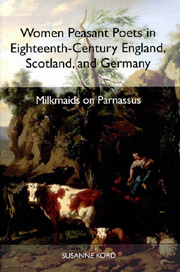Book contents
- Frontmatter
- Contents
- List of Illustrations
- Acknowledgments
- Introduction: Aesthetic Evasions and Social Consequences
- 1 Back to Nature: Bourgeois Aesthetic Theory and Lower-Class Poetic Practice
- 2 The Wild and the Civilized: Poet Making
- 3 The Life As the Work: Counterfeit Confessions, Bogus Biographies, Literary Lives
- 4 A Literature of Labor: Poetic Images of Country Life
- 5 Inspired by Nature, Inspired by Love: Two Poets on Poetic Inspiration
- 6 Of Patrons and Critics: Reading the Bourgeois Reader
- Conclusion: On the Gender and Class of Art
- Appendix: Short Biographies of Women Peasant Poets
- Works Cited
- Index
2 - The Wild and the Civilized: Poet Making
Published online by Cambridge University Press: 05 February 2013
- Frontmatter
- Contents
- List of Illustrations
- Acknowledgments
- Introduction: Aesthetic Evasions and Social Consequences
- 1 Back to Nature: Bourgeois Aesthetic Theory and Lower-Class Poetic Practice
- 2 The Wild and the Civilized: Poet Making
- 3 The Life As the Work: Counterfeit Confessions, Bogus Biographies, Literary Lives
- 4 A Literature of Labor: Poetic Images of Country Life
- 5 Inspired by Nature, Inspired by Love: Two Poets on Poetic Inspiration
- 6 Of Patrons and Critics: Reading the Bourgeois Reader
- Conclusion: On the Gender and Class of Art
- Appendix: Short Biographies of Women Peasant Poets
- Works Cited
- Index
Summary
The Wages of Suffering and the Wages of Sin: Class Issues and Literary Patronage
Literary patronage is worth reinvestigating with an eye to class issues, which are relevant for both patron and protégée. As discussed in the previous chapter, it is only possible to argue that patronage disappears from the eighteenth-century literary scene if one equates bourgeois literary history with literature in general. Viewed differently, it would be just as easy to argue that the old-style system of patronage — consisting of a patron's direct protection and supervision of and control over his or her protégée — is retained, albeit with some significant changes, throughout the eighteenth century. One major shift taking place with respect to literary patronage in the eighteenth century would, following this argument, be one of class. The roles of both patron and protégée are passed down the ranks: in the patron's case, from royalty to the aristocracy and from there to the bourgeoisie, and in the poet's case, from the bourgeoisie to the lower classes. The fact that the first shift in the patron's class has been noted in scholarship on the history of literary patronage while the second has been ignored can, again, be read as a testimony to the generalization of bourgeois literary history as literary history: patronage, by its very definition, necessitates a class difference between patron and protégée, and thus the recognition of the bourgeois patron's role would entail an acknowledgment of lower-class authorship — counterintuitively so, given the identification of bourgeois authorship with authorship in general.
- Type
- Chapter
- Information
- Women Peasant Poets in Eighteenth-Century England, Scotland, and GermanyMilkmaids on Parnassus, pp. 48 - 104Publisher: Boydell & BrewerPrint publication year: 2003

